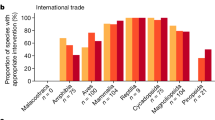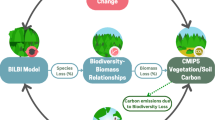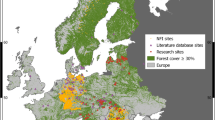Abstract
THE African elephant (Loxodonta africana), living in its natural habitat in East Africa, has suffered over the last few decades from progressive restrictions resulting in overcrowding within national parks and sanctuaries1,2 and a relatively rapid deterioration of its habitat from woodland to open grassland3,4. Much of the latter change has been precipitated by the elephants themselves pushing over young trees to eat the succulent growing shoots, or stripping the oil bark and exposing the trees to damage by periodic fires5.
This is a preview of subscription content, access via your institution
Access options
Subscribe to this journal
Receive 51 print issues and online access
$199.00 per year
only $3.90 per issue
Buy this article
- Purchase on Springer Link
- Instant access to full article PDF
Prices may be subject to local taxes which are calculated during checkout
Similar content being viewed by others
References
Laws, R. M., and Parker, I. S. C., Symp. Zool. Soc. Lond., 21, 319 (1968).
Laws, R. M., J. Reprod. Fertil. Suppl., 6, 495 (1969).
Beuchner, H. K., and Dawkins, H. C., Ecology, 42, 752 (1961).
Eggeling, W. J., J. Ecol., 34, 20 (1947).
Napier, Bax P., and Sheldrick, D. L. W., E. Afr. Wildl. J., 1, 40 (1963).
Laws, R. M., J. Reprod. Fert. Suppl., 6, 193 (1969).
Sikes, S. K., Symp. Zool. Soc. Lond., 21, 251 (1968).
McCullagh, K. G., E. Afr. Wildl. J., 7, 91 (1969).
McCullagh, K. G. E., Afr. Wildl. J., 7, 85 (1969).
Crawford, M. A., Lancet, ii, 1329 (1968).
McCullagh, K. G., Atherosclerosis (in the press).
Bowyer, D. E., Leat, W. M., Howard, A. N., and Gresham, G. A., Biochim. Biophys. Acta, 70, 423 (1963).
Moore, J. H., and Sikes, S. K., Comp. Biochem. Physiol., 20, 779 (1967).
Schrade, W., Biegler, R., and Bohle, E., J. Atheroscl. Res., 1, 47 (1961).
Duncan, W. R. H., and Garton, C. A., J. Lipid Res., 3, 53 (1962).
Moore, J. H., and Williams, D. L., Br. J. Nutr., 19, 407 (1965).
Olegard, R., and Svennerholm, L., Acta Paediat. Scand., 59, 637 (1970).
Holman, R. T., Progress in the Chemistry of Fats and Other Lipids (edit. by Holman, R. T.), 9, part 2, 279 (Pergamon Press, Oxford, 1968).
Holman, R. T., J. Nutr., 70, 405 (1960).
Lowry, R. R., and Tinsley, I. J., Biochim. Biophys. Acta, 116, 398 (1966).
Balachandran, R., Butkus, A., and Ehrhart, L. A., Circulation, 42, III–11 (1970).
Alfin-Slater, R. B., and Aftergood, L., Physiol. Rev., 48, 758 (1968).
Author information
Authors and Affiliations
Rights and permissions
About this article
Cite this article
MCCULLAGH, K. Are African Elephants deficient in Essential Fatty Acids?. Nature 242, 267–268 (1973). https://doi.org/10.1038/242267a0
Received:
Revised:
Issue Date:
DOI: https://doi.org/10.1038/242267a0
This article is cited by
-
Evolution of chemical signals in the Asian elephant,Elephas maximus: behavioural and ecological influences
Journal of Biosciences (1999)
Comments
By submitting a comment you agree to abide by our Terms and Community Guidelines. If you find something abusive or that does not comply with our terms or guidelines please flag it as inappropriate.



